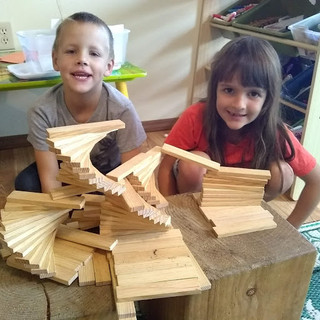Watching Beautiful Things
- Oct 14, 2018
- 3 min read
A visitor to our school recently remarked, "They take such good care of each other!" I loved her observation because helping to build compassionate people is one of the goals of our school, and I was so glad that she could see it at work. We want our children to be kind, an active process that requires them to put themselves in the shoes of their classmates. We work on apologizing for our missteps, taking responsibility for our actions, and de-escalating tense situations. It's a tricky set of skills to assess except through careful observation. Our teachers are with our students throughout the day during academic times, recess, and lunch. We have the luxury of watching those skills build and jumping in with a little support when it's needed.
Rachel's PreK Reflections
We are seeing so many beautiful things happen at this point in our Preschool--skills starting to blossom, longer passages of poems and songs being recited by the children, and attention spans lengthening! We've practiced learning how to sit and listen through many activities, including listening to and taking turns telling stories. There are activities available to continue practicing this skill which the children can choose during their "work" time in the classroom, and we see them choose these activities regularly. This week, we reached our ultimate goal on this topic: listening respectfully to others for even longer periods of time. "Show and Tell" is what we've been using all week to celebrate (and practice) this accomplishment, and the children have enjoyed both sharing their special item/skill/story with the classroom and listening to their classmates share theirs! As their teacher, I've also enjoyed learning about all of the special things in their lives.
Embedded Assessment
I gave my math students a test at the beginning of the year to check on their current knowledge, and it was a useful tool to see what they could accomplish independently after a summer's break from school. We use other specific assessment tools, but much of our assessment happens during the daily workings of the classroom. For our Spanish café this week, each child counted out money to spend. I listened, watched, and supported the process of counting the money. Our youngest students were working on counting out 20 pennies. Our older students were using pennies, nickels, dimes, and quarters to make a dollar. I could see who knew the values of the coins, who needed help counting by 5's, and who needs to work on the numbers in the teens. There wasn't a worksheet, and they might even tell you they were playing, but there was important math happening. We use this same sort of embedded assessment throughout our day. During writing workshop, I notice who has grasped my lesson on using periods and who could use a different explanation. I ask children to explain to me how they can build a curving set of stairs and listen carefully to their words to see if they are using words that reflect our conversation about forces. Each of these observations and conversations informs and shapes my next set of lessons.
Our Theme: Physics
What's the tallest structure you can build with playdough and toothpicks? Can you make a bridge with those materials? Can you make a cantilever? How much weight can it hold? Our children have been experimenting with different building materials during choice time to grapple with all of these questions.
This past week included a series of experiments with ramps. We looked to see how fast cars went down ramps at different angles. We also hypothesized how changing the surface of a ramp would impact a car's speed. Ask your child if the plain wood, sandpaper, or felt covered surface made for the fastest ride. We watched a car hit various objects at the bottom of the ramp and predicted what would happen each time. Students noticed that heavier objects didn't move as far, that some of the moving energy of the car turned into sound energy when it crashed, and that the car sometimes moved backwards. They came up with questions to test in the future, and we'll be experimenting more in the weeks to come.







































Comments